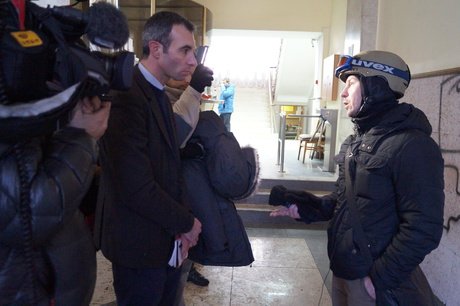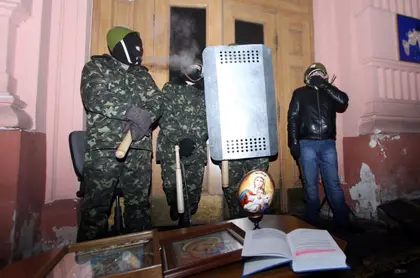“If the building of the Ministry of Justice is not freed instantly, I will be forced to appeal to my colleagues, members of the National Security and Defense Council, to discuss introduction of martial law in the country,” she said.
Her message was primarily aimed at Spilna Sprava (Common Cause), a group of angry militant young men led by Oleksandr Danylyuk. A lawyer by training, Danylyuk started off as a defender of rights of businessmen, and ended up being one of the most radical, revered and feared leaders of the protest movement, which has been raging in the nation since November.
JOIN US ON TELEGRAM
Follow our coverage of the war on the @Kyivpost_official.
Members of the group over the past three days have seized the country’s Agriculture Ministry, Energy Ministry and Justice Ministry buildings in central Kyiv. On Dec. 1, they also took over the city hall along with Svoboda, the right-wing party.
The group continues to occupy the Agriculture Ministry, which it besieged on Jan. 23, but it returned the Energy Ministry to the state the same day it was taken, on Jan. 25. On Jan. 27, the group also vacated Ukraine’s Justice Ministry less than 24 hours after it stormed its front doors. Instead, Spilna Sprava will block entrance to the ministry, Danylyuk wrote on Facebook on Jan. 27.
The building seizures have caused major headaches for opposition leaders hoping to negotiate an end to the current political gridlock with embattled President Viktor Yanukovych and led to accusations by authorities that more radical groups were doing so in order to stockpile weapons inside.
“Such kind of actions may (lead to) war,” Svoboda Party member Yuriy Syrotiuk told the Kyiv Post. “We should make a tough decision on this issue.”
Pavlo Rozenko, an opposition lawmaker with Vitali Klitschko’s UDAR Party, noted that there are different movements present in the EuroMaidan protest movement, and that some, like Spilna Sprava, have at times provoked authorities through their actions – actions, he said, that they “do not support.”
“The situation is getting more radical, unfortunately, because the authorities don’t want to agree on a compromise,” he told the Kyiv Post.
Danylyuk was sharp in his response to the opposition’s comments.
“When we were throwing Molotov cocktails on Hrushevskoho Street (the site of clashes between protesters and police last week) we were heroes, and now we are provocateurs,” he wrote on Facebook. “Opposition, a provocation is not our peaceful seizures of ministries, but your 150 brainless councils without a single plan of action, which have led to our guys being beaten and kidnapped in the streets, that the center of Kyiv for a week has had military actions taking place. You, impotents, are responsible for their deaths, as well.”
He also warned authorities that his colleagues would be ready to capture the Justice Ministry on Jan. 28, should parliament during its extraordinary session the same day fail to concede to demands of the opposition and EuroMaidan.
Speaking to the Kyiv Post by phone, Danylyuk said that his group knows how to take control over all of the government’s buildings if ongoing peace talks bring no result.
Who is Oleksandr Danylyuk?
A longtime activist, Danylyuk graduated from the Kyiv National Economic University in 2003 with a master’s degree in law and studied business and law as an intern in the Czech Republic, France and Ukraine. He speaks English fluently.
He was active in Ukraine’s 2004 Orange Revolution that overturned Yanukovych’s win at the time, which was found to have been rigged.
In 2009, he published a book of poetry, titled “Praetorians: After and Before the Revolution.” His poems reflect upon how politicians betrayed the goals and principles of the 2004 Orange Revolution and aims to inspire citizens to become more active in civil society.
But it was a protest movement known as the Tax Maidan in December 2011 that shot Danulyuk to national prominence as an activist and leader. The protest then was against proposed tax changes tilted against working-class people.
It was then that he started Spilna Sprava, the group that has made headlines over the few days as it led takeovers on government buildings.
Danylyuk has called the group “a network of collective security” that lobbies the interests of small- and medium-sized business, which also fights against what he says is a “Russian invasion” of Ukraine.
“Our actions, are not civil resistance to Ukrainian leadership only. We see (the current political crisis in Ukraine) as a Russian invasion and occupation of our country,” he told the Kyiv Post on Jan. 27, adding that the group is a volunteer organization whose single source of support is the people of Ukraine.
Asked whether he deemed his group’s actions “extremist,” in the words of some government officials, he responded: “We are not radical. We are very adequate people who take adequate measures.”
“We have not kidnapped people or killed, we are still in the borders of self-defense. We do things now to stop kidnappings and killings,” he added.

In a past interview with Danylyuk, he told the Kyiv Post that his goal is to create a powerful civil society platform that would be a watchdog for politicians and the government. But many in the opposition camps accuse him of providing fodder for the government, which is considering the imposition of a state of emergency, a charge he denies.
“What does it even mean – a state of emergency? I don’t think that it isn’t already declared – we have corpses on Hrushevkosho Street. We have thousands of injured people, dead Ukrainians… (and their blood) is on the hands of the government,” he said.
“I think that we (EuroMaidan protesters) are very, very peaceful people who have stood on Independence Square for two months, and during this time regime used violence against us, they killed us, destroyed our property and cars, took us to prisons. We were very peaceful in this period. Now is the time for actions.”
“We will stop when a new president is inaugurated,” he added.
The Right Sector, another branch of radicals
Danylyuk is not the only radicalized and angry young man on Maidan, though. Another group, the Right Sector, has been awarded the title generously by the government and the foreign media.
On Jan. 25, Interior Minister Vitaliy Zakharchenko, in an address to Ukrainians and foreign diplomats, that the opposition is stockpiling weapons in the buildings that had been seized earlier. He said the Right Sector was the culprit.
“According to the information received by the law enforcers, in the Trade Union House and the Kyiv State Administration firearms are being stockpiled,” he said.
The next day, several European and North American ambassadors were invited to check out the Trade Union House, including the fifth floor, where the Right Sector is housed – a conglomerate of right-wing and paramilitary organizations that have been a part of EuroMaidan defense structure and who were at the center of the three-day violent clashes with police on Jan. 19-21.
The ambassadors stepped over sleeping people in the narrow corridors as they toured the fifth floor. They were often greeted in English and thanked for support.
The tour, conducted by chocolate tycoon and opposition leader Petro Poroshenko, as well as former Interior Minister Yuriy Lutsenko, who said he came out of hiding for several days because he got a tip off that there is a new order for his arrest. He spent more than two years in prison in a case that the European Court for Human Rights said was political.
Ambassadors were also accompanied by Dmytro Yarosh, leader of the Right Sector, and commandants of the Trade Union House, which since Dec. 1serves as the revolutionary headquarters.
The opposition members went to great pains to explain that people who are quartered in the Trade Union House are peaceful protesters and have been an essential part of EuroMaidan’s defense since Nov. 21, the first day of the protest movement.
“Even when Berkut attacked us on Dec. 10, our guys were in the first line of defense. They were hit on the head, fell down and the next ones in line could come to replace them. But they did not hit back,” Yarosh explained.
Asked who made the Molotov cocktails to hurl at police during violent clashes, members of the opposition explained that there was a barrel of fuel close to the site of protests, and anyone was able to make their own Molotov cocktails.
Ambassadors hailed the gesture of transparency on behalf of the opposition and attempted to deliver a message of peace.
“There should be no anti-Semitism, there should be no more violence and no takeover of government buildings,” said Geoffrey Pyatt, the U.S. ambassador, at the meeting. He said that not only will such actions turn the world against Ukraine’s protesters, but “undermine your position in the political negotiations.”
Both Pyatt and Canadian Ambassador Troy Lulashnyk said their governments were looking into the option of sanctions against Ukrainian officials.
Kyiv Post editors Christopher J. Miller and Katya Gorchinskaya can be reached at [email protected] and[email protected], respectively.
You can also highlight the text and press Ctrl + Enter




